We have all been there. That uncomfortable, bloated feeling when your digestive system just will not cooperate. You find yourself searching for solutions, maybe drinking more water or reaching for a high fiber snack. But what if the very foods you are eating are quietly making the problem worse? The path to relief is often paved with not just what you should eat, but more importantly, what you need to stop eating. This guide provides a complete list of the foods to avoid when constipated, all backed by clear scientific reasons and expert advice.
Table of Contents
Navigating digestive distress can be frustrating, especially when it feels like you are doing everything right. It is crucial to understand that certain foods, even some healthy ones, can act as roadblocks in your digestive tract. We will explore the science behind how your diet impacts regularity, identify the common culprits that are likely in your kitchen right now, and offer actionable strategies for immediate relief. This is your definitive resource for understanding the foods that worsen constipation and reclaiming your digestive comfort.
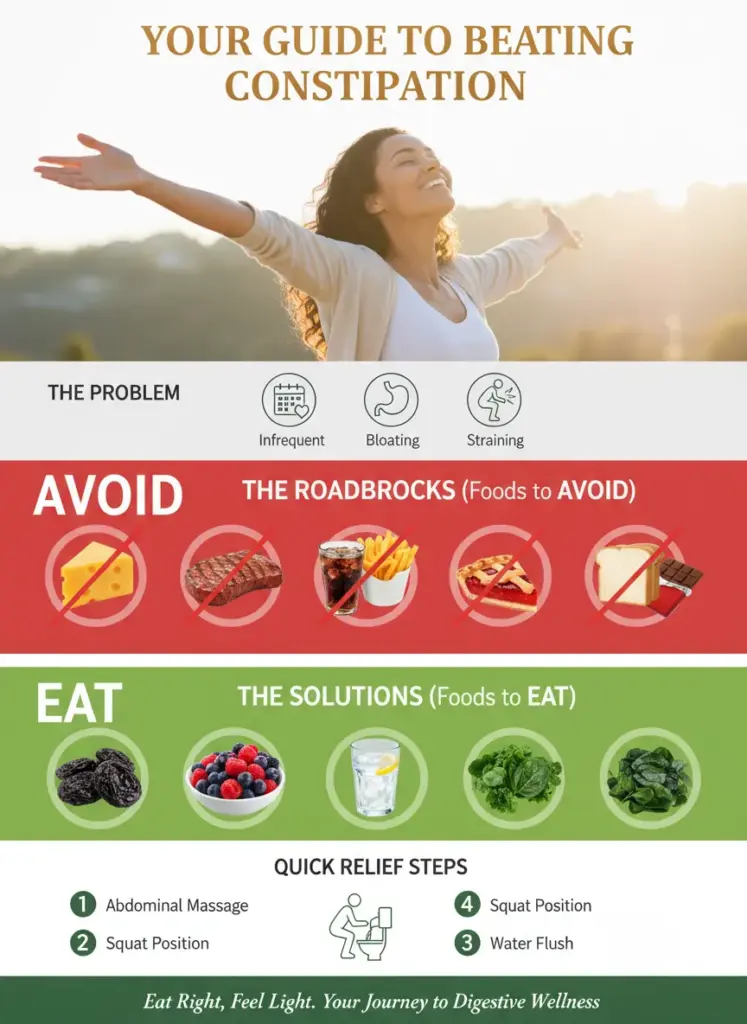
Understanding Constipation: More Than Just a Feeling
Before we dive into the specific foods to avoid if constipated, it is important to have a clear picture of what is happening inside your body. It is more than just a temporary inconvenience; it is a clinical condition with specific signs.
What is Constipation? A Clinical Definition
Constipation is not just a subjective feeling of being “backed up.” According to the National Institute of Diabetes and Digestive and Kidney Diseases (NIDDK), it is medically defined by symptoms that include having fewer than three bowel movements a week. Other key signs are stools that are hard, dry, or lumpy and are difficult or painful to pass. This condition is one of the most frequent gastrointestinal complaints in the United States.
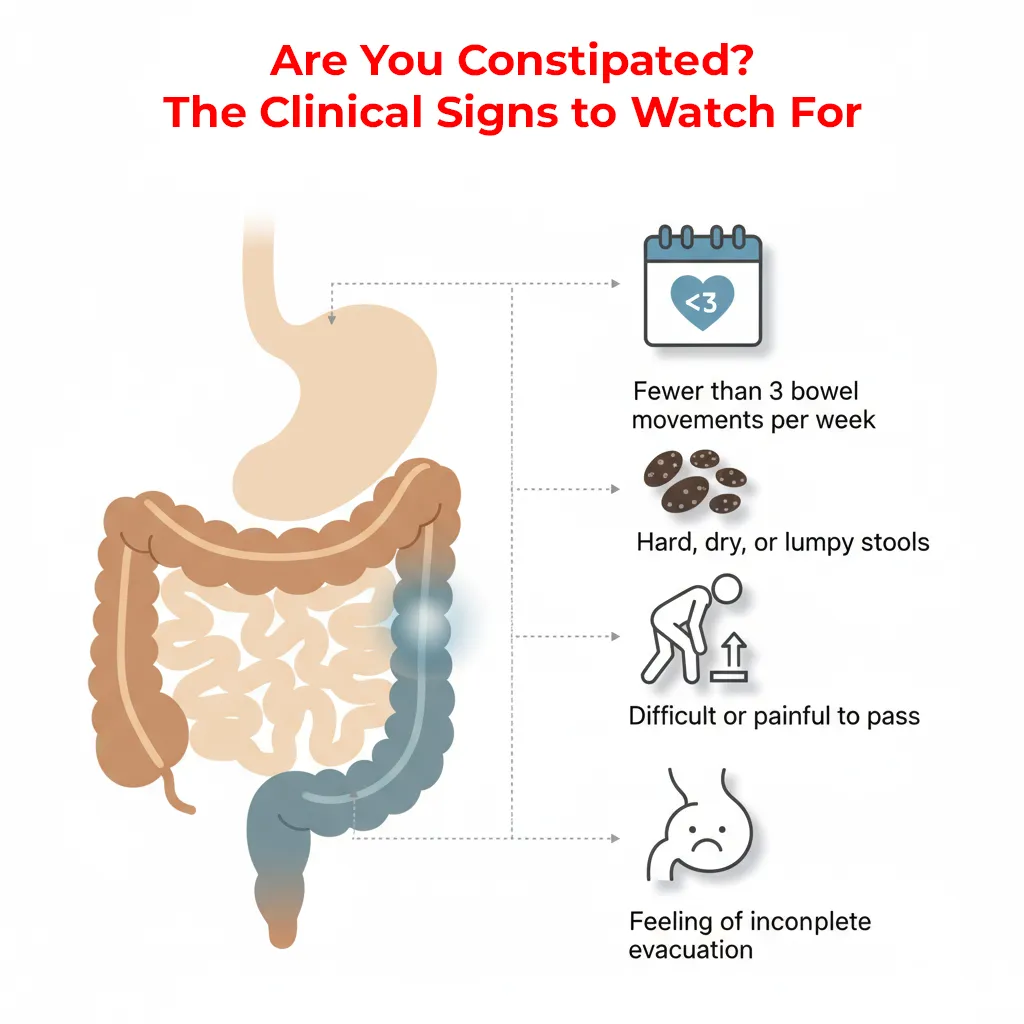
The American Fiber Crisis: A Driving Factor
A primary reason so many people suffer is a widespread dietary issue. The average American diet is notoriously low in fiber. This “fiber crisis” is a major contributor to rising rates of constipation. The consequences are significant. A Mayo Clinic report highlighted a staggering 23% increase in emergency room visits for adults over 50 due to complications from constipation, directly linking the trend to the popularity of low fiber, highly processed foods.
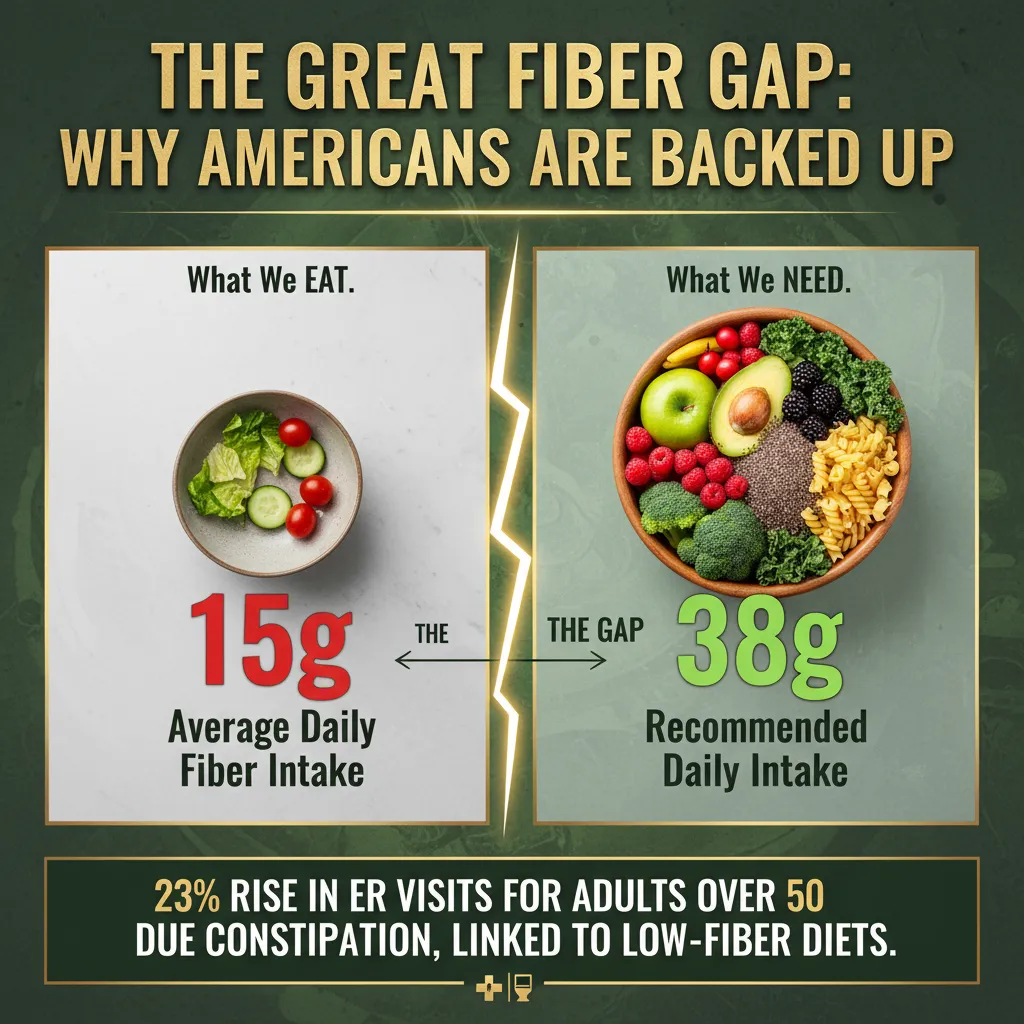
When your diet lacks fiber, waste moves too slowly through the colon. The longer it sits there, the more water the colon absorbs from it. This process results in the hard, dry stools that are the hallmark of constipation. Understanding which foods to avoid during constipation is a critical step in breaking this cycle.
The Ultimate List: 7 Surprising Food Groups to Avoid When Constipated
Identifying the primary dietary culprits is your first line of defense. Here are seven food groups that are well known to contribute to or worsen constipation. Cutting back on these can make a significant difference in your digestive regularity and overall comfort.
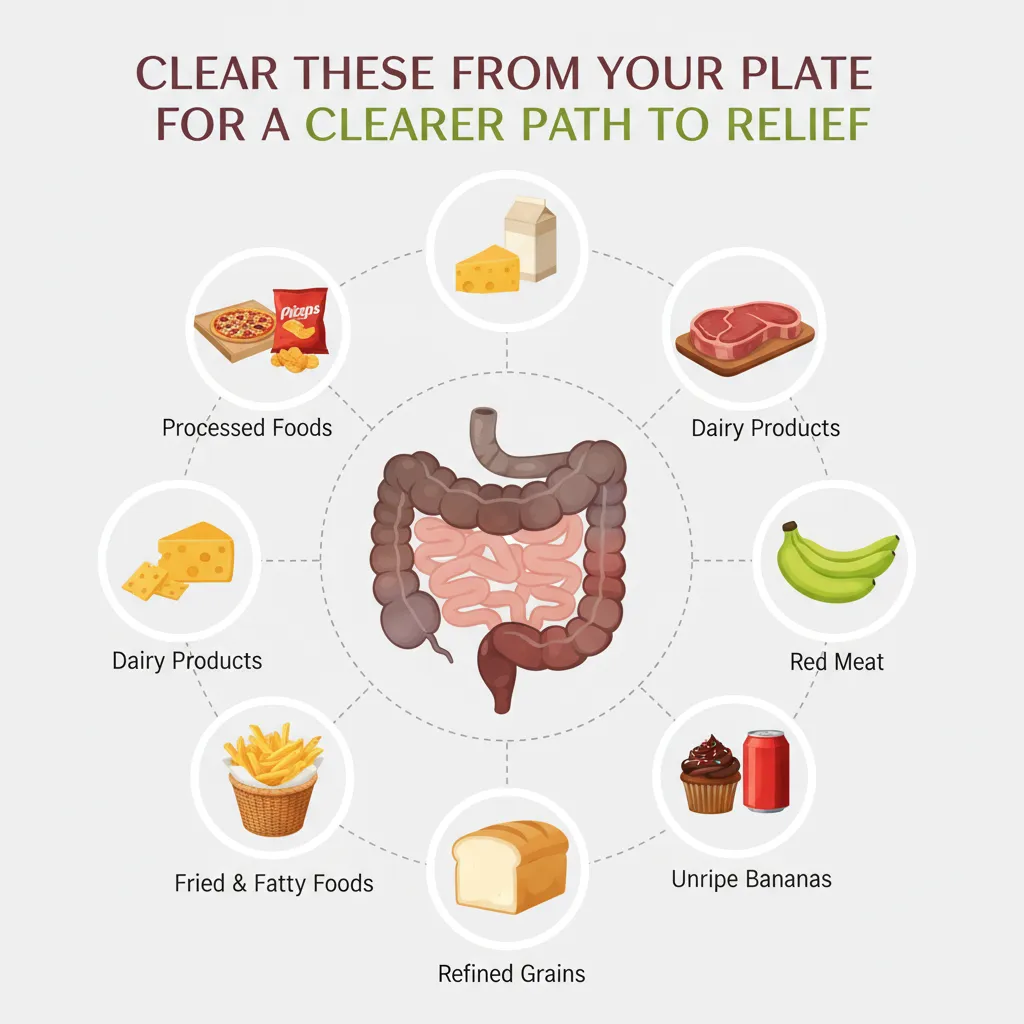
1. Processed and Fast Foods
In our busy world, convenience often wins. Unfortunately, that convenience comes at a cost to our digestive health. Processed foods like frozen dinners, chips, packaged pastries, and fast food burgers are among the worst foods for constipation. They are typically stripped of natural fiber and loaded with fat and sodium.
High sodium levels can worsen the problem by causing your body to pull water out of the colon to maintain balance elsewhere, further drying out your stool. The lack of fiber means there is nothing to add bulk and softness, making waste harder to move. This is why many people on social media platforms like Reddit and Quora ask, “Why are my kids so constipated on a processed food diet?”. It is a direct result of these nutrient poor, low fiber options.
2. Dairy Products (Milk, Cheese, Ice Cream)
For many people, dairy products can be a significant trigger for digestive slowdowns. If you are wondering why avoid dairy when constipated, the answer often lies with lactose and certain proteins. Lactose, the sugar in milk, can be difficult for some people to digest, leading to gas, bloating, and constipation.
Furthermore, dairy products like cheese and ice cream are high in fat and contain virtually no fiber. Casein, a protein found in milk, has also been linked to slowed digestion in some studies. While probiotic rich yogurt can be beneficial for gut health, it is wise to limit other high fat dairy products if you are struggling with regularity. Finding the right foods to avoid when constipated often involves looking at your dairy intake.
3. Red Meat
While a good source of protein and iron, red meat like beef, steak, and sausage can be tough on your digestive system. There are three main reasons it contributes to constipation. First, it is high in saturated fat, which can slow down the digestive process. Second, its tough protein fibers can be challenging for your body to break down.
Finally, red meat often replaces higher fiber options in a meal. If you fill your plate with steak instead of beans or lentils, you are missing a key opportunity to get the fiber your colon needs. This combination of factors firmly places red meat on the list of foods that harden your stool.
4. Fried and Fatty Foods
Foods that are deep fried, such as french fries, fried chicken, and donuts, are notoriously hard to digest. The high concentration of fat in these foods significantly slows down gut motility, which is the coordinated muscular contraction that moves waste through your intestines.
When this process slows, more water is absorbed from the stool, making it harder and more difficult to pass. Instead of frying, consider healthier cooking methods like baking, grilling, or air frying. These methods reduce the fat content, making meals easier on your digestive system and helping you avoid common things to avoid when constipated.
5. Refined Grains (The “White” Foods)
Refined grains, often called “white” foods, have had their most nutritious parts, the bran and germ, stripped away during processing. This includes white bread, white rice, regular pasta, and bagels. The bran is the outer layer of the grain and is a major source of fiber.
By removing it, you are left with a starchy product that lacks the bulk necessary for healthy bowel function. A diet high in these products is a textbook example of low fiber foods and constipation. Swapping these for whole grain alternatives is one of the most effective dietary changes you can make.
6. Sugary Snacks and Drinks
Candy, cakes, cookies, and sugary sodas offer little to no nutritional value and are completely devoid of fiber. These foods are high in fat and refined sugar, which can disrupt the delicate balance of your gut microbiome. A healthy gut relies on a diverse population of beneficial bacteria to function properly.
High sugar intake can feed less desirable bacteria, leading to inflammation and poor digestive function. When you are deciding what not to eat when severely constipated, sugary treats should be the first thing you eliminate.
7. Unripe Bananas and Persimmons
This one often surprises people. While ripe yellow bananas are a good source of soluble fiber and can help with constipation, unripe green bananas have the opposite effect. They are high in resistant starch, which is difficult for your body to digest, and also contain tannins, compounds that can slow down gut motility.
Persimmons are another fruit known to be high in tannins, especially when not fully ripe. If you are struggling with constipation, make sure your bananas are yellow with a few brown spots, a sign that the resistant starch has converted to simple sugars. Knowing these nuances helps you choose the right foods and avoid those that worsen constipation.
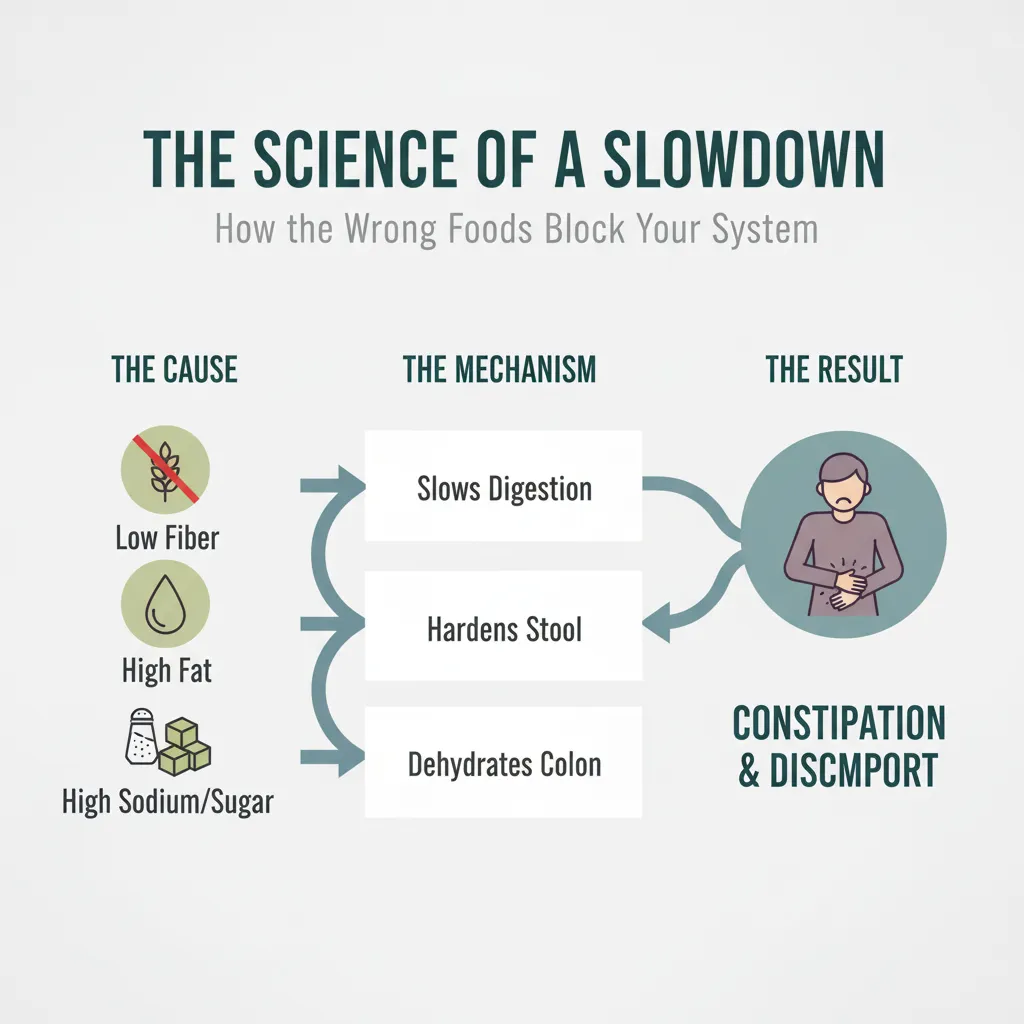
At-a-Glance: 20 Specific Foods That Can Worsen Constipation
To make it even clearer, here is a detailed list of specific foods and the primary reason each one can be a problem when you are constipated.
| Food to Avoid | Primary Reason to Avoid When Constipated |
| 1. Potato Chips | High in fat which slows digestion, and high in sodium which can dehydrate the colon. |
| 2. Frozen Pizza | A combination of refined flour crust, high-fat cheese, and processed meats with minimal fiber. |
| 3. Fast-Food Burgers | High in saturated fat from the patty and served on a low-fiber, refined white bun. |
| 4. Instant Noodles | Typically flash-fried and made from refined flour, offering almost no dietary fiber. |
| 5. Hard Cheese | High in fat, contains zero fiber, and can be particularly binding for some individuals. |
| 6. Ice Cream | A triple threat of high fat, high sugar, and low fiber. Lactose can also be an issue. |
| 7. Whole Milk | Contains no fiber and can be constipating for those with lactose sensitivity or intolerance. |
| 8. Beef Steak | High in saturated fat with tough protein fibers that can be difficult and slow to digest. |
| 9. Sausages & Hot Dogs | Processed meats are very high in fat and sodium, with little to no fiber content. |
| 10. French Fries | Deep-fried in oil, their high-fat content significantly slows down gut motility. |
| 11. Donuts | A combination of refined flour, high sugar content, and being deep-fried. |
| 12. White Bread | The fiber-rich bran and germ have been removed, leaving only starch. |
| 13. White Pasta | A refined grain product that lacks the necessary fiber to add bulk and softness to stool. |
| 14. Bagels | A dense food made from refined flour with a very low fiber to calorie ratio. |
| 15. White Rice | The fibrous husk, bran, and germ are all removed, making it starchy and binding. |
| 16. Chocolate Bars | High in sugar and fat. Some research suggests large amounts can slow digestion. |
| 17. Cookies & Pastries | Made with a trifecta of refined flour, sugar, and fat, all of which worsen constipation. |
| 18. Unripe Bananas | Contain high levels of resistant starch and tannins, which slow down digestion. |
| 19. Persimmons | Rich in tannins, compounds that can decrease intestinal secretions and slow muscle contractions. |
| 20. Alcohol | Acts as a diuretic, leading to dehydration which pulls necessary water away from the colon. |
Comparison Table: Foods That Worsen Constipation vs. Foods That Provide Relief
Making the right choices can be easier when you see them side by side. Here is a clear comparison of the foods to avoid if constipated versus the foods that can help you find relief.
| Foods to AVOID When Constipated (Low Fiber, High Fat/Sugar) | Foods to EAT for Constipation Relief (High Fiber & Water) |
| Processed Snacks (Chips, Crackers) | Prunes and Kiwifruit |
| Fried Foods (French Fries, Donuts) | Berries (Raspberries, Blackberries) |
| Red Meat (Beef, Sausage) | Legumes (Lentils, Beans, Chickpeas) |
| Dairy (Cheese, Ice Cream, Milk) | Whole Grains (Oatmeal, Brown Rice, Quinoa) |
| Refined Grains (White Bread, White Pasta) | Leafy Greens (Spinach, Kale) |
| Sugary Treats (Candy, Cakes, Soda) | Pears and Apples (with skin) |
| Unripe Green Bananas | Nuts and Seeds (Chia, Flax, Almonds) |
Special Considerations: Managing Constipation in High-Risk Groups
Certain life stages and age groups are more susceptible to constipation. Tailoring your approach and knowing the specific foods to avoid when constipated for these groups is essential for effective management.
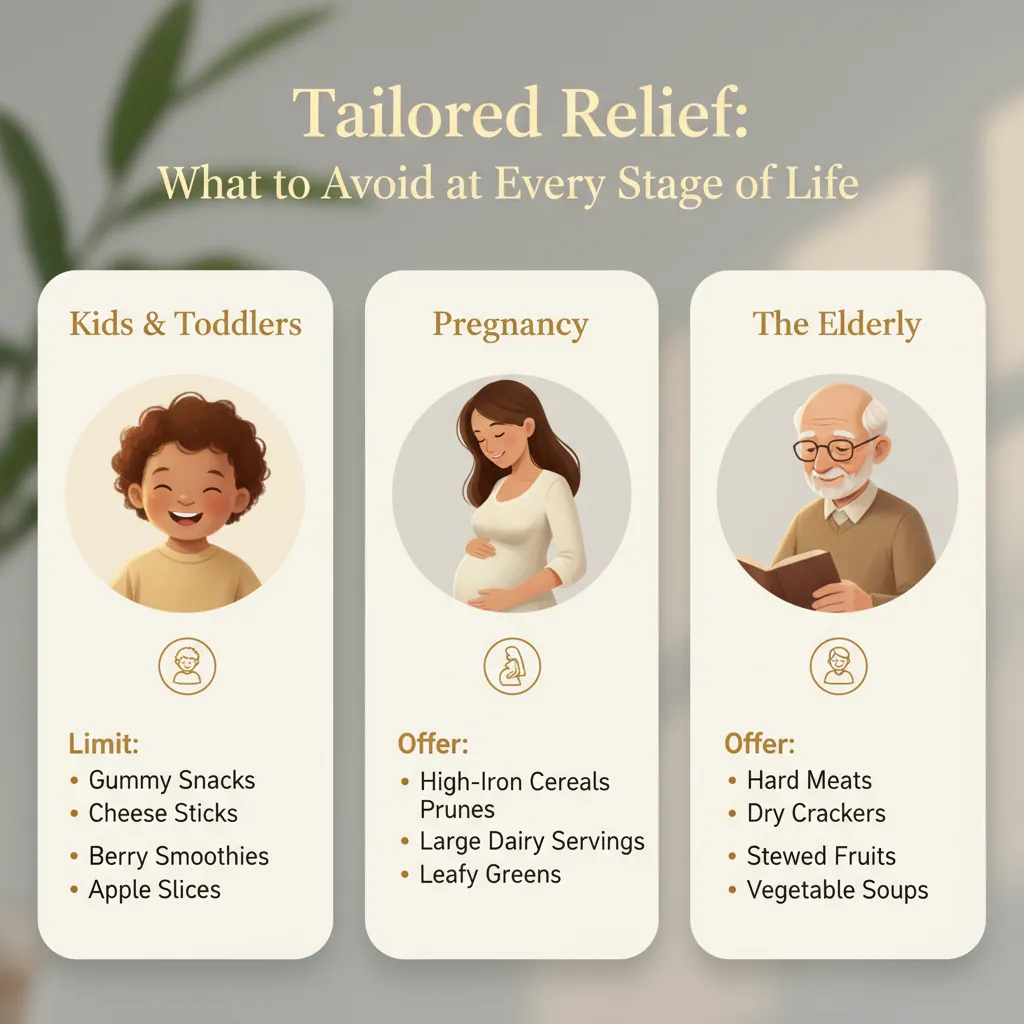
For Kids & Toddlers: Navigating Picky Eaters
Constipation in young children is incredibly common and often tied to diet. With the prevalence of processed snacks, many toddlers develop a preference for low fiber foods. This has become so common that U.S. pediatric hospitals now routinely screen toddlers for chronic constipation.
The key is to limit the foods to avoid when constipated for kids, such as gummy snacks, cheese sticks, white crackers, and excessive milk. Instead, offer fun, high fiber alternatives like apple slices with sunflower seed butter, colorful berry smoothies, or oatmeal with a sprinkle of cinnamon. The American Academy of Pediatrics (AAP) emphasizes adequate fiber and fluid intake as the cornerstone of digestive health in children.
For Pregnant Women: A Common But Manageable Symptom
Pregnancy brings a host of hormonal changes that can slow down the digestive tract. The pressure of the growing uterus on the intestines and the constipating effect of some prenatal vitamins, especially iron, can make matters worse. A survey revealed that 61% of pregnant women reported their constipation was worsened by dairy and iron supplements.
The key is to focus on a diet high in fiber and fluids and to be mindful of the specific foods to avoid for constipation in pregnancy. Limiting large servings of cheese, refined grains, and red meat can help. The American College of Obstetricians and Gynecologists (ACOG) recommends discussing any dietary changes or use of supplements with your healthcare provider to ensure safety.
For the Elderly: Addressing Age-Related Digestive Changes
Older adults often face a higher risk of constipation due to a combination of factors. A naturally slower metabolism, reduced physical activity, medication side effects, and dehydration can all contribute. It is crucial to identify and limit the foods to avoid constipation in elderly individuals.
These often include the usual suspects: heavy dairy products, processed meals, and large portions of red meat. The focus should shift to easy to chew, high fiber foods like cooked vegetables, stewed fruits like prunes, and soft whole grain breads. Warm liquids, such as herbal tea or simple broth, can also be very soothing and effective.
Quick Relief Strategies: What to Do When Severely Constipated
When you are feeling deeply uncomfortable, you need strategies that work quickly. These methods can help stimulate your system and provide relief when you need it most.
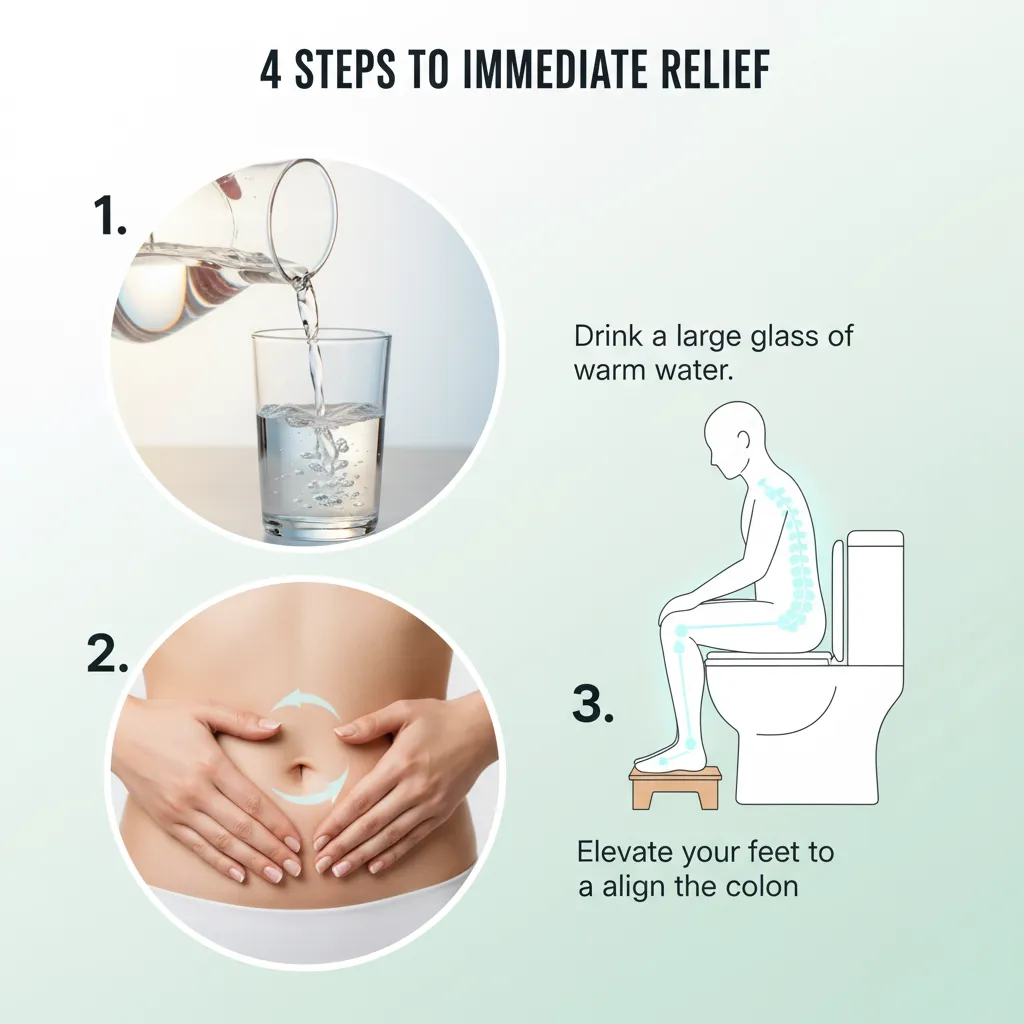
The Best Drinks for Immediate Relief
Hydration is paramount. Dehydration is a leading cause of constipation, so increasing your fluid intake is the first and most important step. Water is best, but warm liquids can be particularly effective. A cup of herbal tea or a mug of warm water with a squeeze of lemon can help stimulate the muscles in your intestines. Prune juice is another classic and effective remedy.
The “7-Second Trick” and Other Bowel-Stimulating Techniques
A term trending in online health communities, the “7 second trick” is not a single magic bullet but a combination of quick, effective actions. These simple home remedies for quick constipation relief include:
- Abdominal Massage: Gently massage your lower abdomen in a clockwise motion to help stimulate movement in the colon.
- The Squatting Position: Use a small stool or a Squatty Potty to elevate your feet while on the toilet. This posture straightens the colon, allowing for an easier and more complete evacuation.
- Hydration Flush: Quickly drinking a large glass (16 to 20 ounces) of lukewarm water can sometimes trigger a bowel movement.
Best Breakfast for Constipation Recovery
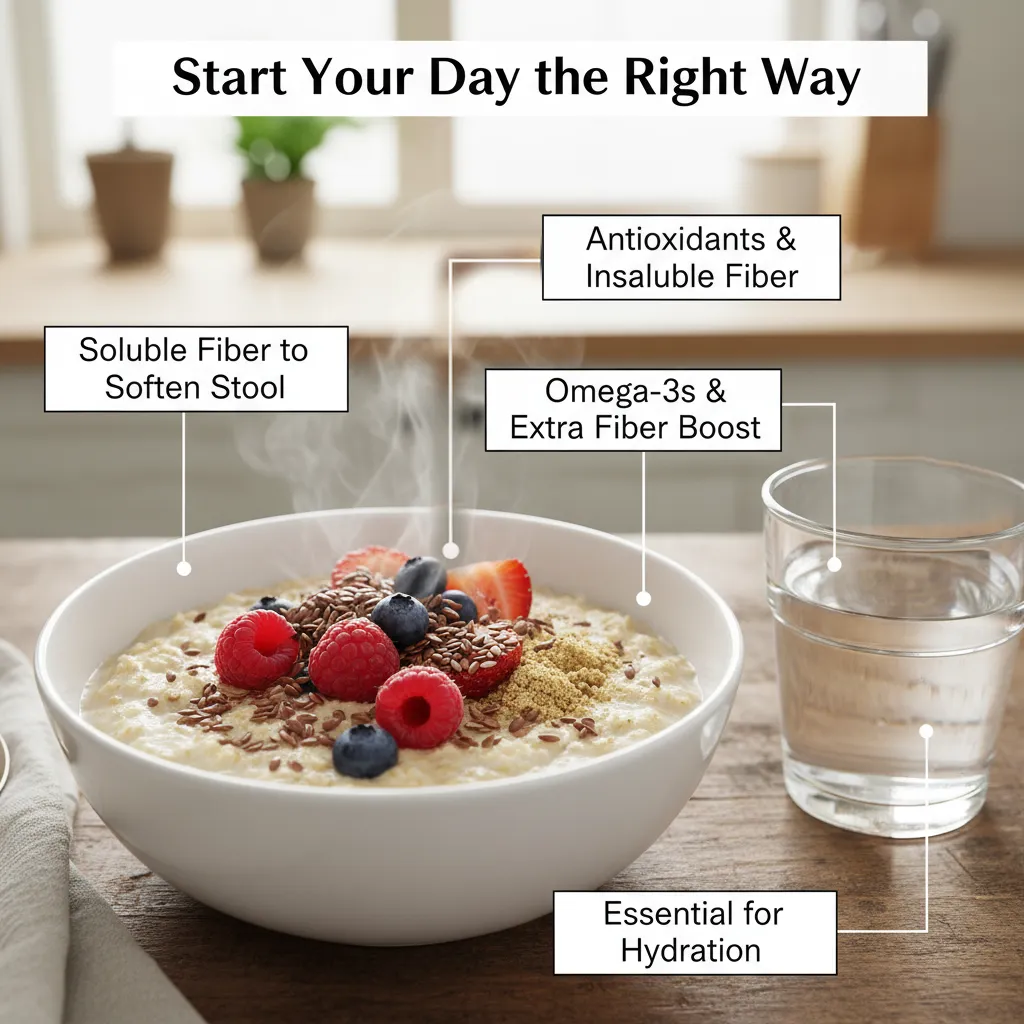
Starting your day with a high fiber meal can set a positive tone for your digestive system. The best breakfast for constipation recovery is one that combines fiber, fluids, and healthy fats. Excellent choices include oatmeal topped with berries and flax seeds, a smoothie made with spinach, kiwi, and chia seeds, or whole wheat toast with mashed avocado.
Long-Term Solutions: Building a Constipation-Proof Diet
While quick fixes are helpful, long term prevention is the ultimate goal. This involves making sustainable changes to your diet and lifestyle to support ongoing digestive health.

The Role of Probiotics, Prebiotics, and Supplements
A healthy gut microbiome is essential for regular bowel movements. Probiotics are beneficial bacteria found in fermented foods like yogurt and kefir, while prebiotics are types of fiber that feed these good bacteria. Foods rich in prebiotics include onions, garlic, and bananas. For some, supplements like psyllium husk (a fiber supplement) or magnesium citrate can be helpful, but it is crucial to consult a doctor before starting any new supplement regimen.
Lifestyle Adjustments
Diet is only one piece of the puzzle. Regular physical activity helps stimulate the natural contraction of intestinal muscles. Managing stress through techniques like meditation or yoga can also have a positive impact, as stress can negatively affect digestion. Finally, try to establish a regular bathroom routine, setting aside time each day to go without feeling rushed.
Summary & Key Takeaways
Your diet is one of the most powerful tools you have for managing and preventing constipation. The discomfort and frustration of being constipated can often be resolved by understanding which foods to eat and, just as importantly, which foods to avoid when constipated. By limiting your intake of processed foods, high fat dairy, red meat, and refined grains, you can significantly improve your digestive function.
The solution lies in shifting your focus to a diet rich in fiber from whole foods like fruits, vegetables, legumes, and whole grains. Paired with adequate hydration and a healthy lifestyle, these dietary changes can help you break the cycle of constipation. You have the power to take control of your digestive health through informed, mindful choices about the food you eat every day.
Frequently Asked Questions (FAQs)
What are the absolute worst foods for constipation?
Highly processed foods, fried foods, and high fat dairy like cheese are among the worst. They are typically low in fiber and high in fat, a combination that slows digestion and can harden stool.
What foods harden your stool quickly?
Foods that are low in fiber and water are the primary culprits. This includes cheese, red meat, and refined grains like white bread and pasta, which can quickly contribute to hard, difficult to pass stools.
How can I relieve constipation in kids quickly and safely?
For safe and quick relief, offer your child prune juice or soft, high fiber fruits like pears. Ensure they are drinking plenty of water throughout the day, and encourage active play. A warm bath can also help relax their abdominal muscles.
What is the number one food to relieve constipation?
Prunes are widely regarded as the most effective food for constipation relief. This is due to their high concentration of both dietary fiber and sorbitol, a natural laxative.
What simple trick empties your bowels immediately?
While “immediately” is not always possible, elevating your feet on a small stool while on the toilet can significantly help. This squatting posture straightens the colon, allowing for a more complete and easier bowel movement.
What should I drink first thing in the morning for constipation?
A large glass of warm water, with or without a slice of lemon, is an excellent way to stimulate your digestive system upon waking.
Is it possible to not be constipated during pregnancy?
Yes, it is possible. Many women can avoid or minimize constipation by proactively eating a high fiber diet, staying very well hydrated, engaging in regular, doctor approved exercise, and discussing their prenatal vitamins (especially iron) with their OBGYN.
Do eggs help you have a bowel movement?
Eggs are a great source of protein but contain no fiber. They do not typically help with bowel movements and, for some sensitive individuals, may contribute to constipation if eaten in large amounts without fiber rich side dishes.
What should I eat when I am severely constipated?
When severely constipated, focus on foods that are high in fiber and water. Think prune juice, warm vegetable soups with beans, and soft, ripe fruits like pears and kiwis. It is crucial to avoid heavy, fatty, and processed foods.
When should I worry about constipation and see a doctor?
You should consult a doctor if your constipation is severe, lasts for more than three weeks, or is accompanied by other worrying symptoms like blood in the stool, unexplained weight loss, or severe abdominal pain.
Can constipation affect a baby during pregnancy?
No, common maternal constipation does not harm the baby, who is well protected in the uterus. However, severe straining can cause secondary issues for the mother, such as hemorrhoids. Always discuss severe symptoms with your doctor.
Are suppositories safe to use during pregnancy?
You must consult your healthcare provider before using any over the counter medication, including laxatives or suppositories, during pregnancy. While some may be safe, only your doctor can give you the right advice for your situation.









